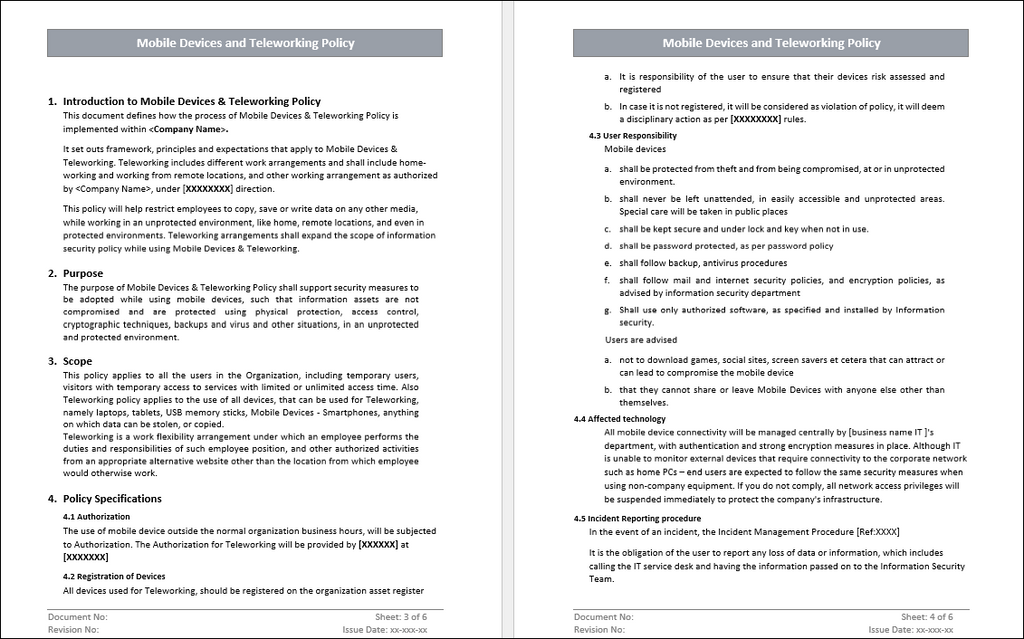ISO 27001 Mobile Device And Teleworking Policy Template
Given the potentially significant advantages of mobile devices and teleworking, companies must have a clear policy regarding their use. This blog post will discuss the critical components of an effective mobile device and teleworking policy. Mobile devices and teleworking have become increasingly prevalent in today's workplace. We have implemented the following procedure to ensure that our employees can work effectively and efficiently.

What Mobile Devices And Teleworking Policy Are Reshaping Our Future?
The way we work is changing. Advancements in technology have made it possible for more and more people to work remotely, and as a result, the traditional office is becoming less and less common. In this blog post, we'll explore how mobile devices and teleworking are reshaping the way we work and the implications for the future of the office. The traditional workplace is no longer the sole location where work is completed. With mobile devices and teleworking, more and more people are working remotely. This shift has implications for how we work and the future of the office.
1. Mobile Devices Are Making Us More Productive: There's no denying that mobile devices have made us more productive. With a smartphone or tablet, we can stay connected to work email, calendars, and files from anywhere. We can also use apps to be more productive while on the go.
2. The Implications For The Future Of Work: The shift to mobile devices and teleworking is likely to profoundly affect a lot of work. As more people work remotely, the need for traditional office space will decline. This could lead to a rise in co working spaces and other alternative work environments.
3. The Office Is Becoming Less Common: As more people work remotely, the traditional office is becoming less common. A recent study by JLL found that the number of people working in downtown offices has declined by 17% since 2010.
Some Examples Of Clauses To Be Included In ISO 27001 Mobile Device Policy
1. Professional Conduct For Work-Related Communication: Employees can use their mobile devices for work purposes, including email, phone calls, and text messages. However, all work-related communication must be professional and adhere to the same standards as if conducted using company-issued equipment.
2. Prohibited Activities On Mobile Devices During Work Hours: Employees must not use their mobile devices for illegal or prohibited activities while on company time or using company resources. ISO 27001 Mobile Device includes downloading unlicensed software, accessing unauthorized websites, or engaging in any activity that could compromise the security of the company's network or data.
3. Ensuring Data Security And Confidentiality On Personal Devices: Employees must take steps to protect the confidentiality of company information when using personal mobile devices for work purposes. This includes storing work-related documents in a secure location and password-protecting all device access.

Some Examples Of Clauses To Be Included In ISO 27001 Teleworking Policy
1. Telework Approval And Performance Expectations: Employees are permitted to telework on an as-needed basis, provided prior approval is obtained from their supervisor. Teleworking arrangements must be made to not negatively impact the employee's job performance or ability to meet job responsibilities.What Topics To Be Included In Your Mobile Device And Teleworking Policy?
In addition to these general guidelines, your mobile device policy should also address the following specific issues:
1. Security: Your policy should require employees to use a password or PIN to unlock their mobile devices and encrypt all work-related data. Employees should also be prohibited from installing unapproved applications on their devices.6. Personal Information: Your policy should state how you will handle employee requests for access to their personal information stored on company servers. For example, you may want to allow employees to view their data but not edit it.
Conclusion
Incorporating a comprehensive ISO 27001 mobile device and teleworking policy is essential for maintaining security and productivity in today's remote work environment. This template provides a solid foundation for creating a policy that addresses key areas of concern such as data security, device management, and acceptable use guidelines. By implementing this policy, businesses can effectively manage the risks associated with mobile devices and teleworking while promoting a culture of compliance and accountability. Access the ISO 27001 Mobile Device and Teleworking Policy Template today to safeguard your organization's digital assets and support remote work initiatives.

